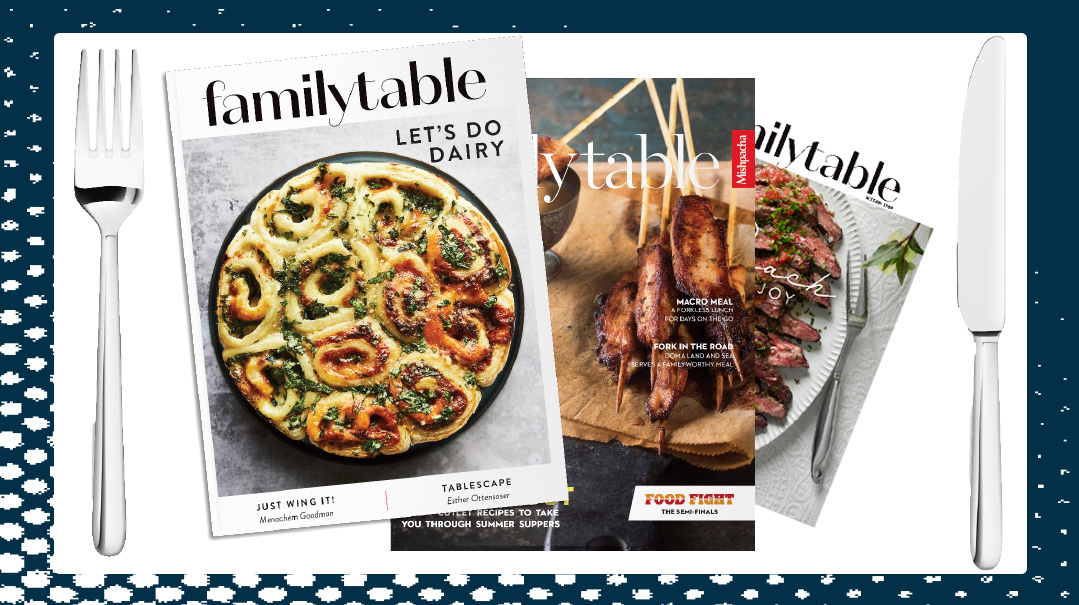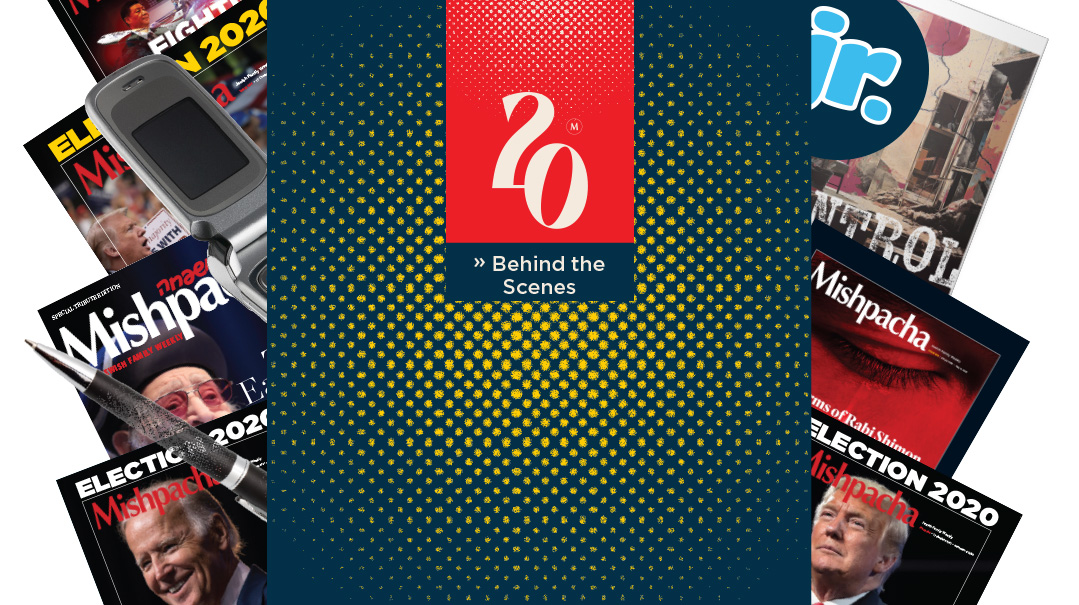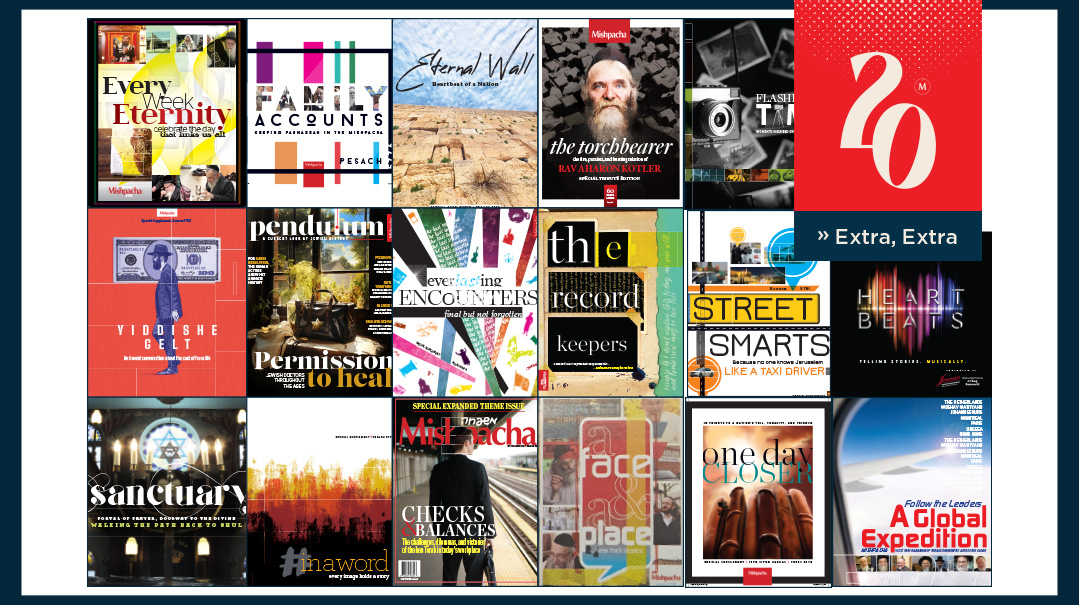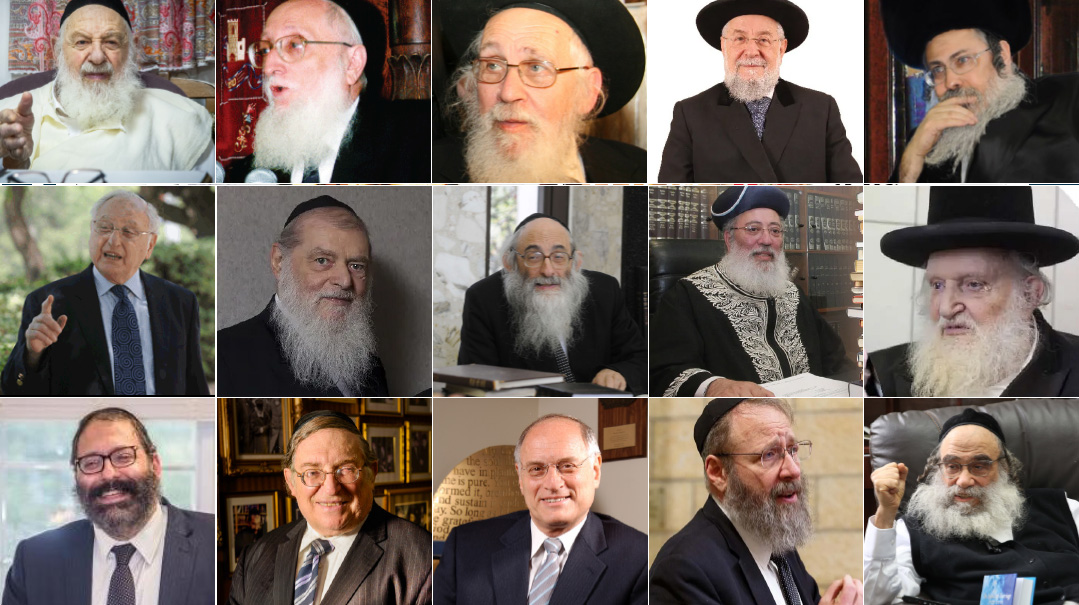Getting Out the Message
| April 16, 2024Our longtime advertisers have seen changes of their own, with seven of them sharing their thoughts and experiences
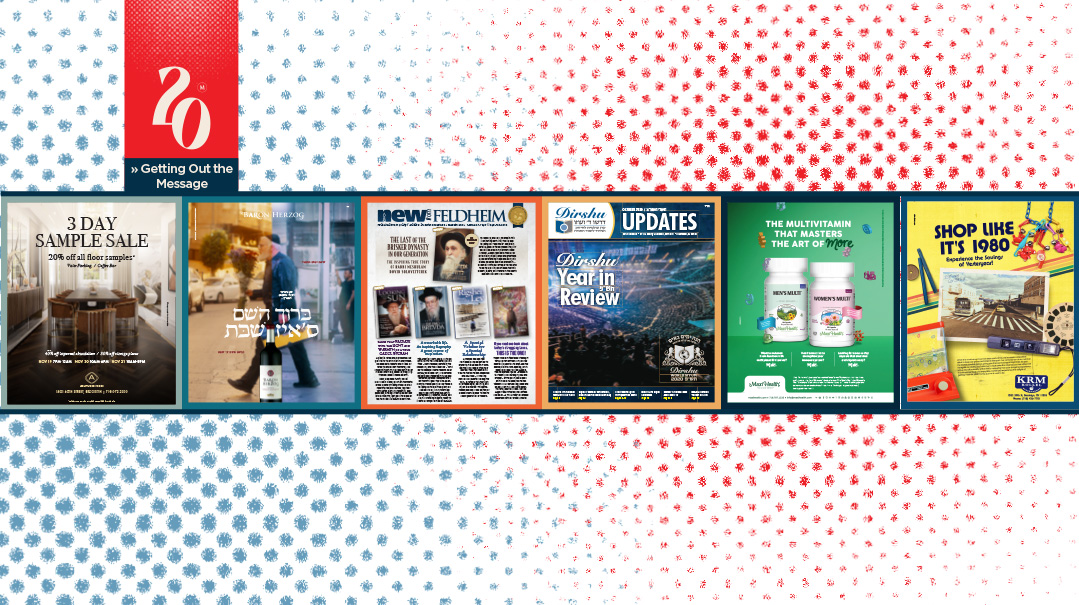
The pages of Mishpacha have evolved over the past two decades, keeping pace with the world around us even as we have grown into the magazine you now hold in your hands today. Our longtime advertisers have seen changes of their own, with seven of them sharing their thoughts and experiences during that time period on the pages ahead.
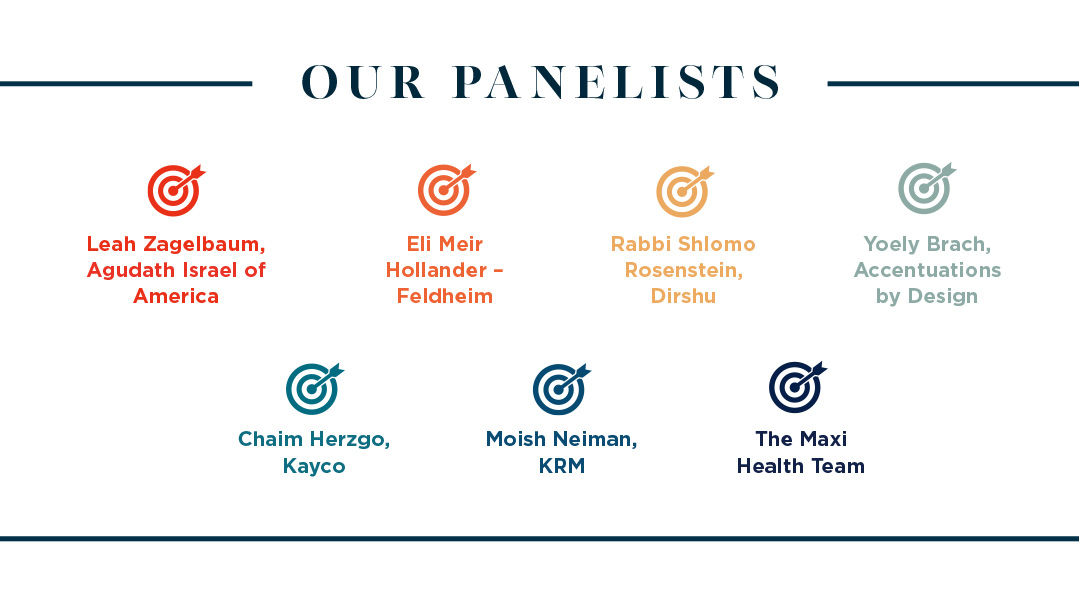
How has your company/organization changed over the last 20 years?
Leah Zagelbaum — Agudah:
The Agudah has to communicate with both the frum and secular worlds in ways that we could have never imagined 20 years ago. With the growth of new media and methods of communication, we’ve had to pivot to reach people where they are — in print and electronically — while maintaining our high standards. It’s a balance, and a constant effort.
Chaim Herzog — Kayco:
I think we are a lot more focused on researching what people want. These days we’re releasing what the market says they are looking for, instead of developing products and then pushing them through.
Moish Neiman — KRM:
We started out as a deep discounter, and were a bare-bones, cash-and-carry type of place. But nowadays, people’s lives are hectic and the world has more of a convenience mindset, so we’ve changed to meet that need. Delivery is now a big part of our business, and we bought the building next door a few years ago in order to be able to provide customer parking.
Yoely Brach — Accentuations:
Twenty years ago we were a store that sold individual furniture, but today we are a full-room design experience. We create ideas and entire rooms. We’ve also gone from doing design with pen and paper to doing everything digitally.
Rabbi Shlomo Rosenstein — Dirshu:
Dirshu’s growth has surpassed all of our expectations, and what began initially as a few kollelim for American balabatim has grown to include 14 different programs in 28 countries on five continents. At least 215,000 people have taken at least one Dirshu test, and our publishing arm has published numerous seforim, most notably, the Dirshu Mishnah Berurah. In a way, it can be said that Dirshu is the world’s largest beis medrash.
The Maxi Health Team:
Covid was a game changer for the world and since then there has been a greater awareness of the importance of maintaining a healthy immune system. Appreciating that reality, we broadened our selection of immune-enhancing products that are suitable for all ages and stages, and are available in tablet, capsule, chewable, and liquid form.
What are some of the challenges you have faced over the past 20 years?
Eli Meir Hollander — Feldheim:
Today there’s more competition than there was 20 years ago, but if the competition will lead to more Torah study that is fine with us. Also, it is relatively easy today for an individual to publish his/her own title (though the quality of the product is not the same as a professionally edited and published work).
But the biggest challenge is securing adequate shelf space in bookstores for all the books coming out. Years ago, a book was considered “new” for six months; now it can be a few weeks, as store owners clear space for the next batch of new titles.
Yoely Brach — Accentuations:
Peoples’ tastes change so quickly that from the time they first come in until the time they make a final decision, they might end up going with something completely different. Social media has a lot to do with that — things move rapidly and people see so many images, a lot of which aren’t even real and aren’t necessarily practical in the long run.
Chaim Herzog — Kayco:
Twenty, 30, 40, and even 50 years ago, our challenge was meeting the needs of the Yiddishe market, so if people needed ketchup and mayonnaise, that is what we made. Today, our horizons have broadened and people are looking for bigger and greater things, and we have evolved to meet that demand.
The Maxi Health Team:
Our challenge has always been to source the highest quality ingredients from around the world without compromising on kashrus. That challenge has only grown since Covid.
Rabbi Shlomo Rosenstein — Dirshu:
Ironically, one of our biggest challenges today is expansion, and it can be difficult, even seemingly insurmountable at times, to cater to the individual needs of so many diverse communities. Yet the demand for Dirshu continues, with additional communities seeking to join Dirshu. Providing ongoing support to hundreds of Dirshu branches worldwide in six different languages is another challenge, one that we have, baruch Hashem, been successful in meeting.
Leah Zagelbaum — Agudah:
One of the biggest challenges we face is the need to articulate who we are, perhaps even more than what we do, a concern that has existed since the days of Rabbi Moshe Sherer’s leadership. Our direct emails (News From Agudah) to our many thousands of subscribers has helped us address this challenge — people can see daily how Agudah impacts frum communities and how our shtadlanus translates into positive realities for mosdos, families, and individuals.
Where would you like to see your company/organization in the next 20 years?
Yoely Brach — Accentuations:
I would love to offer complete room visualization, so that our customers could put on a set of virtual reality goggles and see themselves in their own homes, surrounded by the designs they are looking at in our showroom. Also, having spent the last 20 years committed to providing very high-end service and delivery as well as the best styles and quality, we hope to continue surpassing expectations.
The Maxi Health Team:
Twenty years from now we look forward to being able to produce an even wider range of supplements made from natural and organic ingredients.
Rabbi Shlomo Rosenstein — Dirshu:
Torah is the ultimate unifier, bringing every believing Jew together. Even as we continue in our mission to help every person maximize their potential, Dirshu’s goal is to continue developing the organization, with an eye toward the supreme goal of seeing the vision of acharis hayamim: “Umalah ha’aretz dei’ah es Hashem kamayim layam mechasim — and the land should be filled with knowledge of Hashem the way water covers the sea.”
Chaim Herzog — Kayco:
We are very thankful for where we are today. We wouldn’t be here without consumers coming back for more and we hope that, with Hashem’s help, people will keep looking up to us as a company with true value that produces products that people want.
Moish Neiman — KRM:
Our vision is the same now as it was when we started and will be the same in 20 years as well — providing the best and freshest possible product at the best possible price.
What product or initiative from the last 20 years brings you the most pride?
Moish Neiman — KRM:
We are incredibly proud of how our store has evolved. It was originally started by Moshe Binik to help melamdim, rebbeim, teachers, and kollel yungeleit feed their families for less, and you needed to be a card-carrying member to get in. In time, we got requests from people with large families who wanted to come shop, and then just regular working families, and people just kept on coming, till we have the store as you see it today.
The store’s name is actually roshei taivos for Kollel, Rebbeim, Mishpachahs, and we pride ourselves on giving people real value for their money. When we sell cases of plastic cups, you aren’t going to have three cups that are stuck together that you can’t separate, or aluminum pans that are so thin you have to double them up when you make a kugel. It’s the best possible stuff at the best possible price.
Leah Zagelbaum — Agudah:
The Siyumei HaShas, in 2012 and in 2020, both of which generated incredible growth in limud hadaf and general limud haTorah. We’ve estimated that lomdei hadaf doubled after each of the last two Siyumim, and we actively encouraged all kinds of limud haTorah in addition — not only Daf Yomi. The Am Echad campaign was another powerful initiative, which mobilized over 150,000 Yidden around the world to stand up for kedushas haKosel and brought their voices to the Israeli government.
The Maxi Health Team:
Definitely our weight loss products like Naturemax protein shakes, D&S Support, and Thin Supreme.
Rabbi Shlomo Rosenstein — Dirshu:
Now that is a difficult question — it’s like asking a parent to pick who is their favorite child!
We are proud of every single one of our programs, because each one caters to a specific need within the wider tzibbur. There are those who benefit from a daf hayomi program, while others benefit more from an amud hayomi slower program. There are those who derive tremendous benefit from the Daf HaYomi B’Halacha program which enables them, in a short amount of time, to incorporate daily halachah into their lives. Yet others need a program such as Kinyan Halacha, which offers in iyun program in halachah that will produce future dayanim.
Certainly, we are very proud of our most recent program, the Amud HaYomi that today, just a short six months after its inception, features around 100,000 learners all over the world. The siyata d’Shmaya merited by all the programs, and especially the Amud HaYomi, is a source of great chizuk.
Eli Meir Hollander — Feldheim:
We partnered with the Rabbi Dr. Joseph Breuer Foundation to publish Rav Hirsch’s works in English and Hebrew, retranslated and edited for a new generation. These volumes have led to a swell of interest across the world in Rav Hirsch’s works, and we are proud to be a part of this effort.
Yoely Brach — Accentuations:
I am incredibly proud to be able to say that I have never looked to see what kind of merchandise other showrooms have. I rely on my own sense of style and I work hard to make sure that our showroom is always a step ahead of everyone else’s.
Which product or initiative do you wish more people knew about?
Rabbi Shlomo Rosenstein — Dirshu:
Actually, we see quite the opposite — an unexpected resurgence of two of our programs — the regular, seven-year cycle of the Daf Yomi and Daf Yomi B’Halachah programs. At the beginning of each new cycle, we are surprised once again by the thousands of new members who sign up to learn these programs and take the tests.
Chaim Herzog — Kayco:
I would love to see people being more open to changing their consumption habits. People in the frum world don’t realize that tuna is typically consumed with mayonnaise to mask the taste of cheap tuna. Good tuna doesn’t need mayonnaise, and our Tuscanini tuna in olive oil is very high quality and is absolutely delicious on its own. But how do you teach people not to mash their tuna with mayonnaise when that’s what people have been doing for the last 100 years?
We see the same thing with olive oil, where the Yiddishe market, which prefers light olive oil, lags behind the general population, which typically uses extra virgin olive oil. It’s meant to be drizzled on salads or vegetables, not used in cooking, and is much healthier. But the Yiddishe market is still committed to using light olive oil. We’ve seen many examples in our business of how our market is trailing six or seven years behind the general market.
Leah Zagelbaum — Agudah:
The Agudah’s Daf Yomi program was launched by Rabbi Meir Schapiro z”l at a Knessiah Gedolah of Agudas Yisrael, but I don’t know that people realize how it has evolved into an incubator for the stunning array of Daf Yomi programs that are available today. Right now, my WhatsApp status is flooded with campaigns for offshoot Daf Yomi programs which appeal to thousands of people. There are Yerushalmi Yomi, Amud Yomi, Halacha Yomi, and other Yomi programs. All of these are the next generation of what Agudas Yisrael carefully nurtured for decades.
Yoely Brach — Accentuations:
I wish more people knew about our room visualization services. You come in and I can do a 3D rendering that will be 98 percent as delivered, giving you the ability to see what things will look like in your home and in your space. Also, there is nothing in our showroom that can’t be customized — everything is made according to customer specs so that it works for them, their homes, and their lives.
The Maxi Health Team:
We have a broad line of supplements for anxiety, depression, mood, and stress that is available in capsule, chewable, powder, and liquid form. We wish more people knew about them!
What is an example of an ad/campaign you’d run today, that you never would have done 20 years ago?
The Maxi Health Team:
One big difference in our advertising today is that we include real reviews from happy customers, because these days, people look to reviews before purchasing products.
Chaim Herzog — Kayco:
A company that wants to grow has to have a comfortable fail rate and we have had our share of products that haven’t done well. We have a healthy risk tolerance, which is an important part of our business. But when it comes to ads, we don’t want to take any risks. What keeps us up at night is the concern not to lower our advertising standards. We really agonize over that and have a strict policy of never turning Yiddishkeit into a marketing tool.
Leah Zagelbaum — Agudah:
Agudah’s “Know Us” campaign is one of our boldest efforts ever, launched in response to the New York Times’ biased and inaccurate coverage of Orthodox and Chassidic communities. In addition to calling out the Times on our website, our marketing campaign included billboards in highly visible locations in Midtown Manhattan, putting the facts out there about our communities and our schools in a very big way.
Yoely Brach — Accentuations:
Today, my ads are not about a picture of a piece of furniture. They are more about lifestyles, with color and boldness. We recently featured an interactive visual of a leopard on the furniture — it really made an impact — but even more so because it identified the vision of how print and pattern create an experience on a deeper level. It also represented how “royalty” isn’t defined by traditional attention to detail, but by dominant trends.
Rabbi Shlomo Rosenstein — Dirshu:
Our modus operandi is “daring.” That is the DNA of Dirshu. We ask each person to challenge himself by learning, taking tests, and meeting the threshold of excellence. We encourage them to actualize their potential. That is also why our advertisements are always daring and innovative. It’s possible that once upon a time we were not quite so daring, but that too is undoubtedly part of our development.
(Originally featured in Mishpacha, Issue 1008)
Oops! We could not locate your form.

